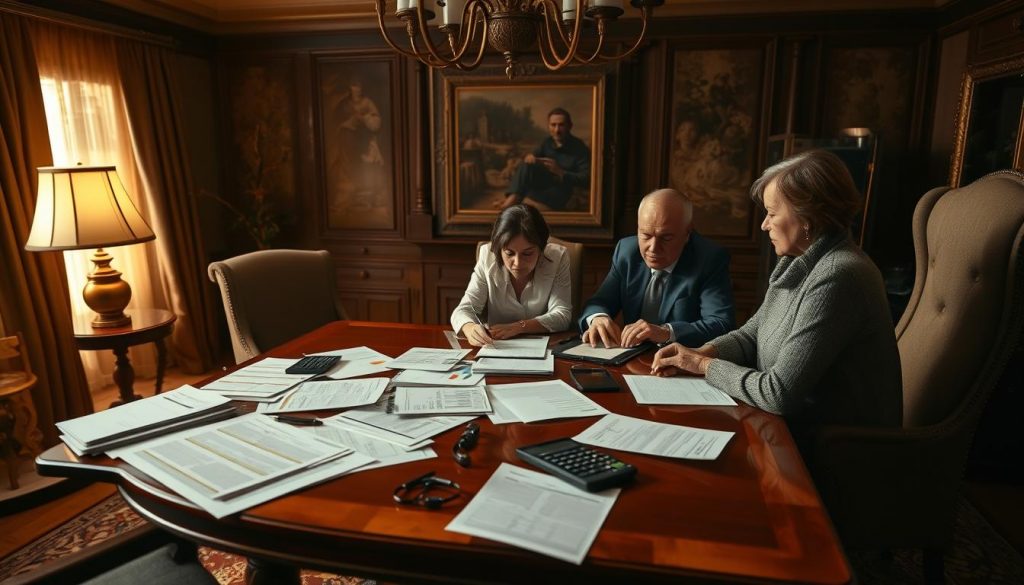We understand the importance of safeguarding your family’s future through careful estate planning. Having an up-to-date last will and testament is vital to protecting your loved ones.
According to Greenpeace, a gift in your Will can help protect the Earth for all future generations. At MP Estate Planning, we can guide you through the process, ensuring that your wishes are respected.
Key Takeaways
- Having an up-to-date Will is crucial for protecting your family’s future.
- A gift in your Will can support causes you care about.
- Careful estate planning ensures your loved ones are protected.
- MP Estate Planning can guide you through the estate planning process.
- A well-planned Will can make a lasting impact on future generations.
Understanding the Importance of a Gift in a Will
Understanding the significance of gifts in Wills is essential for effective estate planning. A gift in your Will, also known as a testamentary gift, allows you to make a lasting impact on your loved ones and favourite charities.
Charitable organisations, such as Greenpeace, highlight that gifts in Wills are central to their plans for the future, supporting their work in environmental conservation. This demonstrates the broader impact of including gifts in your Will.

Definition of a Gift in a Will
A gift in a Will can take various forms, including a fixed amount, a percentage of your estate, or a specific item. This flexibility allows you to tailor your gifts according to your wishes and financial situation.
- A fixed amount: A specific sum of money left to a beneficiary.
- A percentage of your estate: Ensures that the beneficiary receives a proportionate share.
- A specific item: Allows you to bequeath personal or sentimental items.
Types of Gifts
Gifts in Wills can be categorised into different types, each serving a unique purpose. Understanding these categories can help you make informed decisions.
- Pecuniary Gifts: These are fixed amounts of money left to beneficiaries.
- Specific Gifts: These involve bequeathing specific assets, such as property or personal items.
- Residuary Gifts: These are gifts that comprise the remainder of your estate after other bequests have been fulfilled.
Why Include Gifts in Your Will
Including gifts in your Will not only benefits your loved ones but also supports charitable causes, leaving a lasting legacy. It’s a way to ensure that your estate is distributed according to your wishes, providing for those you care about and supporting causes that are important to you.
By understanding the different types of gifts and their implications, you can make informed decisions about your Will, ensuring that your wishes are carried out effectively.
The Legal Framework Surrounding Wills in the UK
Understanding the legal framework surrounding Wills in the UK is crucial for effective estate planning. The laws governing Wills are designed to protect the testator’s wishes while ensuring that the distribution of their estate is carried out legally and fairly.
The legal landscape for Wills in the UK is governed by specific legislation that outlines the requirements for a valid Will and the process for executing it. This includes understanding the probate process, which is essential for validating the Will and distributing the estate according to the testator’s instructions.

Key Legislation Governing Wills
The primary legislation governing Wills in the UK includes the Wills Act 1837 and the Administration of Estates Act 1925, among others. These laws have been amended and updated over the years to reflect changes in societal needs and legal practices.
- The Wills Act 1837 sets out the basic requirements for a valid Will, including the testator’s capacity and the proper execution of the document.
- The Administration of Estates Act 1925 deals with the distribution of the estate when there is no Will or when the Will does not cover the entire estate.
Requirements for a Valid Will
For a Will to be considered valid in the UK, it must meet certain criteria:
- The testator must be at least 18 years old and of sound mind.
- The Will must be in writing.
- The testator must have signed the Will in the presence of two independent witnesses, who must also sign the document.
Ensuring that these requirements are met is crucial for avoiding disputes and ensuring that the testator’s wishes are respected.
Common Pitfalls to Avoid
There are several common pitfalls to avoid when creating a Will:
- Failing to properly sign and witness the document.
- Not clearly identifying the assets to be distributed.
- Ignoring the potential for disputes among beneficiaries.
By understanding these potential issues, individuals can take steps to mitigate them, ensuring that their last will and testament is executed as intended.
Charities, such as the WWF-UK, emphasize the importance of having a valid Will, as gifts in Wills make up a significant portion of their income. This highlights the broader impact of Wills beyond personal estate planning, contributing to societal causes and charitable organisations.
Deciding What to Gift
The decision of what to gift in your will involves a thoughtful consideration of your personal and financial assets. This process is crucial in ensuring that your wishes are respected and your loved ones are taken care of.
Personal vs. Financial Assets
When deciding what to gift, you’ll need to consider both personal and financial assets. Personal assets might include family heirlooms, jewelry, or other sentimental items, while financial assets could encompass savings, investments, and property. It’s essential to strike a balance between gifting assets that hold emotional value and those that provide financial security.
For instance, leaving a family home to your children can be both a sentimental and financial gift, providing them with a place to live and a valuable asset. On the other hand, gifting personal items like jewelry or artwork can serve as a reminder of your love and connection.
Emotional Considerations
Emotional considerations play a significant role in deciding what to gift. Certain assets may hold sentimental value or emotional significance, making them important to include in your will. It’s not just about the monetary value; it’s about the memories and feelings attached to these items.
For example, gifting a piece of jewelry that has been passed down through generations can be a meaningful way to keep family traditions alive. Similarly, leaving a specific asset to a particular beneficiary can be a way to acknowledge their relationship with you.
Impact on Inheritance Tax
Understanding the impact of your gifts on inheritance tax is crucial. According to Greenpeace, leaving a gift in your will can help reduce the amount of inheritance tax payable. This can be an effective way to ensure that your beneficiaries receive more of your estate.
By carefully considering what you gift and to whom, you can make informed decisions that minimize the inheritance tax liability. This might involve gifting certain assets during your lifetime or making charitable donations, both of which can have a positive impact on reducing the tax burden on your estate.

By taking a thoughtful and informed approach to deciding what to gift in your will, you can ensure that your wishes are carried out and your loved ones are protected. This involves a careful balance of personal, financial, and emotional considerations, as well as an understanding of the tax implications.
Choosing the Right Beneficiaries
The decision on who to include as beneficiaries in your Will is both personal and significant. It’s a choice that reflects your values, relationships, and priorities. When considering your options, you may wish to think about the individuals and organisations that have made a difference in your life.
Family Members
Family members are often the primary beneficiaries of a Will. You may wish to leave a bequest to your spouse, children, or other relatives. This can provide them with financial security and peace of mind after you’re gone. When deciding on the distribution among family members, consider their needs and circumstances.
Friends and Charitable Organisations
In addition to family, you may also want to consider friends and charitable organisations. Leaving a legacy to a friend who has been significant in your life can be a meaningful way to acknowledge their importance. Similarly, charitable organisations that align with your values can benefit from a testamentary gift, continuing your support for their causes even after you’re gone. For more information on the benefits of charitable giving, you can visit our page on charitable giving in estate.
Acknowledging Relationships
Acknowledging relationships through your Will can be a powerful way to express your gratitude and care. Whether it’s a family member, friend, or charitable organisation, your gifts can have a lasting impact. By thoughtfully choosing your beneficiaries, you can ensure that your Will not only distributes your assets but also reflects your personal connections and values.
What Happens if There is No Will?
Not having a will in place can result in your estate being divided in ways you might not have intended. This can lead to unintended consequences, potentially leaving your loved ones with a complex and stressful situation to navigate.

Intestacy Rules Explained
When someone dies without a valid will, the intestacy rules apply. These rules dictate how the estate is distributed among relatives, with the order of priority typically starting with the spouse or civil partner, followed by children, parents, siblings, and other relatives.
The application of intestacy rules can be quite rigid, failing to account for the deceased’s wishes or the specific needs of their family members. For instance, a spouse might receive a significant portion, but the distribution might not align with the deceased’s intentions regarding other assets or beneficiaries.
How Intestacy Affects Gifts
Without a will, gifts to specific individuals or charities are not legally binding. This means that any wishes regarding specific bequests are not formally recognized, potentially leading to disappointment for those expecting such gifts.
Furthermore, intestacy can complicate matters for executors or administrators of the estate, as they must adhere strictly to the legal guidelines governing the distribution, rather than following any expressed wishes of the deceased.
The Consequences of Not Having a Will
The consequences of dying without a will can be far-reaching, affecting not just the distribution of assets but also the well-being of loved ones. For example, without a will, the court will decide who should be the guardian of any minor children, which might not align with the parents’ preferences.
Moreover, the lack of clear instructions can lead to disputes among family members, potentially resulting in costly and emotionally draining legal battles. As highlighted by organizations like Greenpeace, having a will is crucial for protecting your family’s future and ensuring that your wishes are respected.
To avoid such complications, it’s essential to engage in estate planning, including drafting a valid will that outlines your wishes regarding the distribution of your estate. This not only provides clarity and peace of mind but also helps in minimizing potential conflicts and ensuring that your loved ones are taken care of according to your intentions.
The Role of Executors in Managing Gifts
Executors play a crucial role in ensuring that your gifts are distributed according to your wishes. They are responsible for carrying out the instructions in your Will, making their role pivotal in estate planning.
Responsibilities of an Executor
An executor’s duties are multifaceted and include:
- Managing the estate’s assets
- Paying off debts and taxes
- Distributing gifts as specified in the Will
According to WWF-UK, choosing an executor who is responsible and communicative is vital to ensure that your wishes are carried out effectively.
How to Choose an Executor
Selecting the right executor is a critical decision. We recommend choosing someone who is not only trustworthy but also capable of managing complex tasks. This could be a family member, a friend, or a professional.
| Executor Characteristics | Ideal Traits |
|---|---|
| Trustworthiness | High level of integrity |
| Organisational Skills | Ability to manage multiple tasks |
| Communication Skills | Effective in keeping beneficiaries informed |
Importance of Communication
Clear communication between the executor and beneficiaries is essential to avoid misunderstandings and ensure a smooth distribution of gifts. We advise executors to keep beneficiaries informed about the progress of the estate administration.
By choosing a competent executor and ensuring they are aware of their responsibilities, you can safeguard your estate plans and ensure that your gifts are distributed as intended.
Tax Implications of Gifts in a Will
Understanding the tax implications of gifts in your will is crucial for effective estate planning. Inheritance tax can significantly impact the value of your estate, but certain exemptions and allowances can help reduce this burden.
Inheritance Tax Explained
Inheritance tax is a tax on the estate of someone who has passed away. In the UK, it is charged at a rate of 40% on the value of the estate above the nil-rate band, which is currently set at £325,000. However, if you leave your home to direct descendants, the nil-rate band can increase to £500,000.
Key Facts About Inheritance Tax:
- The standard rate is 40% on the estate’s value above the threshold.
- Some gifts are exempt, such as those to charities.
- The nil-rate band can be transferable between spouses.
Exemptions and Allowances
Certain gifts are exempt from inheritance tax. For instance, gifts to charities, like the Greenpeace Environmental Trust, are free from UK inheritance tax. Additionally, gifts to your spouse or civil partner are generally exempt, provided they are UK domiciled.
“Gifts to certain charities are free of UK inheritance tax,” notes Greenpeace, highlighting the benefits of charitable giving in reducing tax liabilities.
Other exemptions include:
- Gifts to political parties.
- Gifts for the public benefit, such as to museums or art galleries.
- Small gifts, typically up to £250, to individuals.
Planning to Minimise Tax Liabilities
Effective planning can help minimize the impact of inheritance tax on your estate. One strategy is to make gifts during your lifetime, as these can be exempt from inheritance tax if you survive for seven years after making them.
| Gift Type | Inheritance Tax Implication |
|---|---|
| Gifts to Charities | Exempt from inheritance tax |
| Gifts to Spouse/Civil Partner | Generally exempt, if UK domiciled |
| Gifts to Direct Descendants | May be eligible for nil-rate band |
It’s also worth considering the residence nil-rate band, which applies if you leave your main residence to direct descendants. This can significantly reduce the inheritance tax burden.
By understanding the tax implications of gifts in your will and utilizing available exemptions and allowances, you can ensure that your loved ones receive more of your estate.
Writing Your Will: Best Practices
Creating a will is a vital process that requires careful consideration and professional guidance. When it comes to estate planning, having a well-structured will is essential for ensuring that your wishes are respected and your loved ones are protected.
Consulting with Professionals
We recommend consulting with legal professionals to ensure your will is valid and executed according to your wishes. According to WWF-UK, having your will made or amended by a legal professional can provide peace of mind and help avoid potential pitfalls. Professionals can offer guidance on the best way to structure your will, taking into account your unique circumstances and the complexities of estate planning.
- Expert knowledge of UK laws governing wills and estates
- Personalized advice tailored to your specific situation
- Assistance with complex issues, such as inheritance tax
Using Online Will-Making Services
For those with simpler estates, online will-making services can be a cost-effective and convenient option. However, it’s crucial to choose a reputable service that complies with UK law. When using online services, ensure that:
- The platform is designed with the latest legal requirements in mind
- You carefully review and understand the terms and conditions
- The final document is properly witnessed and signed
Reviewing and Updating Your Will
Creating a will is not a one-time task; it’s essential to review and update it periodically to reflect changes in your life, such as marriage, divorce, or the birth of a child. Regular updates ensure that your will remains relevant and effective in carrying out your wishes. We advise reviewing your will every 3-5 years or upon significant life events.
By following these best practices and seeking professional advice when needed, you can create a last will and testament that truly safeguards your family’s future. Remember, estate planning is an ongoing process that requires attention and updates to ensure your wishes are carried out.
Distributing Gifts: Fairness and Conflict
Ensuring that your testamentary gifts are distributed fairly can help prevent disputes among your loved ones. A well-planned bequest not only reflects your wishes but also minimises potential conflicts.
Addressing Potential Conflicts Among Beneficiaries
Conflicts can arise when beneficiaries feel that the distribution of gifts is not fair or equitable. We recommend discussing your decisions with your loved ones to avoid such conflicts, as suggested by organisations like Greenpeace.
Open communication is key to preventing misunderstandings. By explaining your reasoning behind certain testamentary gifts, you can help your beneficiaries understand your wishes.
Strategies for Equitable Distribution
Achieving an equitable distribution of gifts involves considering various factors, including the value of the gifts and the relationships between beneficiaries.
- Consider the monetary value of each gift to ensure fairness.
- Reflect on the emotional significance of certain gifts to specific beneficiaries.
- Be transparent about your decisions and the reasoning behind them.
The Role of Mediation
In cases where conflicts do arise, mediation can be a valuable tool for resolving disputes. A neutral third-party mediator can help facilitate discussions and find a resolution that respects your wishes as outlined in your legacy plans.
| Strategy | Description | Benefit |
|---|---|---|
| Open Communication | Discussing your gift distribution plans with beneficiaries. | Reduces misunderstandings and conflicts. |
| Mediation | Using a neutral third-party to resolve disputes. | Facilitates fair resolution and respects your wishes. |
| Transparent Decision Making | Clearly explaining the reasoning behind your gift distribution. | Helps beneficiaries understand your intentions. |
By carefully planning your bequest and considering the potential for conflict, you can create a legacy that is both meaningful and fair to your beneficiaries.
Special Considerations for Digital Assets
As we increasingly live our lives online, it’s crucial to consider how our digital assets will be handled after we’re gone. Digital assets are an integral part of our modern lives, encompassing everything from social media profiles and email accounts to digital photos, cryptocurrencies, and online banking information.
What Constitutes Digital Assets?
Digital assets include a wide range of online accounts and files. These can be personal, financial, or even sentimental in nature. For instance, many of us store precious family photos in the cloud or maintain active social media profiles that hold sentimental value. The WWF-UK highlights the importance of considering these digital assets in your estate planning, ensuring that your digital legacy is managed according to your wishes.
- Social media accounts
- Email accounts
- Digital photos and videos stored online
- Cryptocurrencies and digital wallets
- Online banking and financial accounts
How to Include Digital Gifts in Your Will
Including digital assets in your will requires careful consideration and planning. You need to ensure that your executor has the necessary information and authority to manage these assets. This can involve providing passwords, instructions on how to access accounts, and specific wishes regarding the distribution or deletion of digital content.
To effectively include digital gifts in your will, consider the following steps:
- Make a list of all your digital assets, including account details and passwords.
- Specify how you want each digital asset to be handled after your passing.
- Ensure your executor is aware of and comfortable with their role in managing your digital legacy.
Protecting Online Accounts
Protecting your online accounts is crucial to prevent unauthorized access and potential fraud. Using strong, unique passwords for each account and enabling two-factor authentication can significantly enhance security. It’s also wise to keep your digital asset list and related instructions up to date and stored securely, potentially with your will or with a trusted individual.
“The way we live, work, and interact online means that our digital legacy is becoming an increasingly important aspect of our estate planning.” This quote underscores the need to integrate digital assets into our overall estate planning strategy, ensuring that our digital footprint is managed in line with our wishes.
By carefully considering your digital assets and incorporating them into your estate planning, you can ensure that your digital legacy is protected and managed according to your wishes. This not only provides peace of mind but also safeguards your family’s future in the digital age.
The Importance of Regularly Reviewing Your Will
As life changes, so too should your Will, to reflect your current circumstances and wishes. Greenpeace advises keeping your Will up-to-date to reflect any changes in your circumstances or wishes. Regularly reviewing your Will is vital to ensuring that it remains relevant and effective.
Life Changes that Necessitate an Update
Significant life events such as marriage, divorce, the birth of a child, or the acquisition of substantial assets necessitate updating your Will. For instance, marriage can automatically revoke a previous Will, making it essential to create a new one. Similarly, divorce may require revising your Will to reflect your changed circumstances and wishes regarding your former spouse.
Other life changes that may require an update include changes in your financial situation, such as acquiring or selling significant assets, or changes in your relationships with beneficiaries or executors. Ensuring your Will reflects these changes is crucial for estate planning and guaranteeing that your wishes are carried out.
Keeping Track of Assets and Beneficiaries
It’s also important to keep track of your assets and beneficiaries. As your assets change, so too may your wishes regarding their distribution. Regularly reviewing your Will ensures that it accurately reflects your current assets and your intentions for their distribution.
- Review your assets regularly to ensure they are correctly distributed according to your wishes.
- Update your beneficiaries as needed to reflect changes in your relationships or their circumstances.
- Consider the impact of updating your estate plan on your overall probate process.
Ensuring Compliance with Legal Updates
Laws surrounding Wills and estate planning can change, and it’s crucial to ensure your Will complies with the latest legal requirements. Regular reviews can help identify any necessary adjustments to maintain compliance and ensure your Will remains valid.
By regularly reviewing and updating your Will, you can ensure that it continues to reflect your wishes and circumstances, providing peace of mind for you and your loved ones.
Taking the First Steps to Draft a Will
Drafting a last will and testament is a crucial step in ensuring that your estate is managed according to your wishes. By taking the time to create a will, you can provide peace of mind for yourself and your loved ones.
Gathering Essential Documents
To start, gather necessary documentation, including details of your assets, debts, and potential beneficiaries. This information will help you make informed decisions about your estate.
Seeking Expert Advice
Seeking professional guidance is vital in creating a valid will. Consider consulting with a solicitor or using a reputable online will-making service, such as the free Wills service offered by WWF-UK, to ensure that your will is properly executed and your executor’s duties are clearly defined.
Making Your Wishes Clear
Clearly outlining your wishes in your will can help prevent potential conflicts among beneficiaries. By making your intentions known, you can ensure that your estate is distributed according to your desires, and your loved ones are protected.

